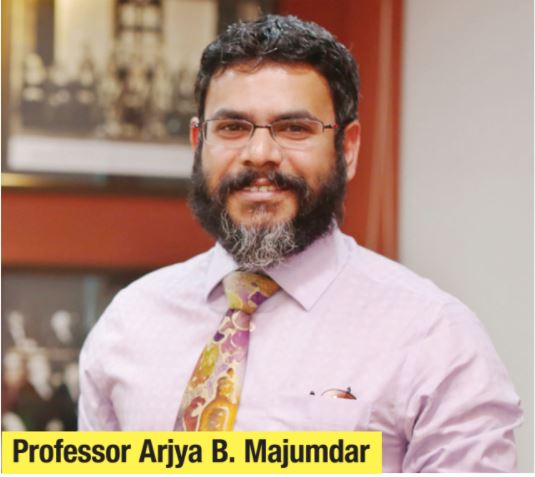 – Professor Arjya B. Majumdar, Dean, Admissions & Outreach, O.P. Jindal Global University
– Professor Arjya B. Majumdar, Dean, Admissions & Outreach, O.P. Jindal Global University
Putting months of speculations to rest, the Indian government has finally decided to scrap the Central Board of Secondary Education (CBSE) Class 12 examinations, giving some sense of direction in the lives of 14 lakh students who had registered to write the exams this year. The significance of this decision which has rightly put safety of students above everything else cannot be overstated in view of the pandemic. The Council for Indian School Certificate Examinations which conducts the Class 12 ISC exams has already followed suit and several other boards are expected to do the same, impacting more lives. The primary reason why this decision has not been an easy one to take is that admissions in a large number of India’s colleges and universities depend solely on the marks that a student obtains in the Class 12 exams. In the absence of an alternative student evaluation system that can gauge their true potential, an exam-centric education system has flourished.
PITFALLS OF EXAM-CENTRIC EDUCATION
The over-reliance on board marks is understandable in a country like India as examinations are possibly the easiest way to determine one’s worth, since they are easy to administer, especially in normal circumstances. In a pandemic situation, holding in-person examination is not without risks. Moreover, depending too much on this easy method (from the assessor’s point of view) of conducting examination has also led to undue emphasis on marks — not on learning — across all levels of education in the country. Such has been the pressure on students to obtain high marks for getting admissions to higher education institutes that the whole purpose of our school education system often appears to be to teach students to take tests. This has led to a misguided competition among students to just memorise their lessons by heart before their exams and reproduce them in their answer sheets. The mushrooming of tuition/coaching centres across the country further amplifies this mad race to score high marks through rote learning.
HOLISTIC APPROACH: NEED OF THE HOUR
What got lost somewhere in this whole system is a learning environment that makes students to think critically, develop curiosity for learning new things, have a sound mental health, learn how to maintain relationships, navigate the available information, and form their own opinions. Unfortunately, the rote learning system of Indian schools has been followed by most of the higher education institutes as well, resulting in the production of what some organisations have called “unemployable” graduates. It only underlines how crucial it has become to adopt a fresh approach to imparting education that can make all of our students ready to confidently participate in the dynamic economy of India and the world. The adoption of a holistic approach does not mean doing away with exams completely, except in extraordinary circumstances of a pandemic or other natural disasters. What it calls for is a shift in focus from scoring marks to blooming of full physical and cognitive faculties. The school education system in Finland, for example, discourages rankings and competitions among students, and yet their approach is recognised as one of the best in the world. The education system adopted by China’s biggest city Shanghai has also earned global laurels for its ability to impart meaningful education to the children through a meticulous process of building an army of excellent teachers, a nuanced student assessment process, and a fairly significant scale of autonomy enjoyed by the schools in terms of curriculum design.
NEP 2020: RIGHT COURSE OF ACTION
It is not that there is not yet enough recognition of the drawbacks of the current learning system in India. The National Education Policy 2020 has mentioned that “Board exams will be redesigned to encourage holistic development” and entrance examinations will also be reformed so that students need not depend on coaching classes to crack them. “Board exams will be made ‘easier’, as they will test core competencies rather than months of coaching/ memorisation,” says the new policy. Whether the fruits of all of these reforms will eventually get reflected in the admission and evaluation process of all higher educational institutes in India or not, only time will tell. But the vision with which the O.P. Jindal Global University (JGU) was set up back in 2009 already aligns with the roadmap charted in the new National Education Policy.
A ROLE MODEL
At a time when many public universities in India lacked a model to help students develop critical thinking, JGU made pioneering efforts to bring the benefits of global education to the doorstep of Indian students. With the aim of creating changemakers of tomorrow who can bring in lasting solutions to the pressing problems that the world is facing today, JGU imparts interdisciplinary education to nurture students in a way that helps them realise their full creative potential. The holistic admissions process that the university has developed therefore takes into account how a student feels, thinks, analyses and communicates. The faculty even conducts personal interviews of admission seekers to most courses in a bid to understand their academic goals and how JGU can be a part of their journey. The fact that many of the new-age higher education institutes are now following the footsteps of JGU in developing interdisciplinary curriculum and the success stories that the alumni have scripted over the years bear testimonials to the revolutionary impact of the global university.



























